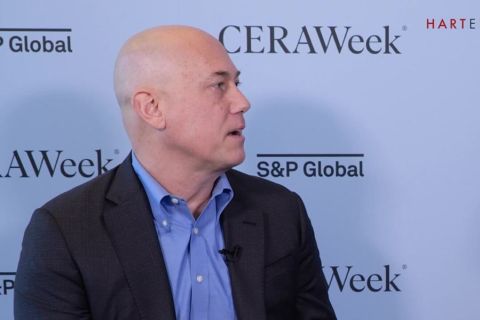Transocean Inc., Houston, will spin off the Gulf of Mexico shallow and inland water business it acquired as part of its merger with R&B Falcon Corp. in 2001 through an initial public offering later this year or in early 2003. "After acquiring the business at the peak, the divestiture of the shallow water fleet at a time when the domestic market is poised to recover may be viewed as dubious," says Karen David-Green, oilfield-service analyst for Credit Lyonnais Securities (USA) Inc. The divestiture also would leave Transocean with virtually no exposure to the North American gas market, adds Robert E. Ford of Sanders Morris Harris Group. He estimates a sale of the business, which also includes drilling operations in Trinidad and Venezuela, would reduce Transocean's 2003 earnings by approximately 16 cents per share. "While these assets are expected to generate only 9% of earnings in 2003, we are at the bottom of a cycle. The transaction would look much more dilutive later in the cycle," Ford says. But the deal could make the company's earnings less volatile, which should aid the stock's multiple, he adds. Transocean plans to use the IPO proceeds to reduce debt. "If it can reduce its debt by $1.5 billion, which is the midpoint between what we think the new company could trade for and what Transocean valued the entity at earlier this year, it could add as much as 21 cents to annual earnings per share," he says. Lewis Kreps of Frost Securities Inc. says, "It will give investors a pure play that feeds off natural gas. It also will refocus Transocean to a more deepwater play, with premium jackups and an international focus. Everybody knew this was going to happen. Some investors will want to play the new company, and some will stick with Transocean. It will be positive for both." Transocean acquired the shallow and inland water operations in early 2001, when it bought R&B Falcon. The fleet has 28 jackups, three submersibles, 31 inland drilling barges and a platform rig, as well as nine land rigs in Venezuela. "These rigs are worth about $1 billion, maybe more. But in 1997, when dayrates were $45,000, they provided the best return for the investment," says Kreps. "These are two niche markets-barges and jackups-that investors could look for as a play off natural gas." Transocean's only significant competitor in the inland-barge business is Parker Drilling Co. Transocean's shallow-water fleet generated $396 million, or 14%, of the company's overall 2001 revenue. David-Green expects it to produce about $245 million of revenue and a modest loss this year. "However, during 2003, we expect this segment to recover and generate approximately $354 million in revenue and contribute positively to profitability," she adds. The segment's decreased fair market value, compared with its carrying value on Transocean's balance sheet, was responsible for Transocean taking a $1.36-billion, or $4.22-per-share, noncash writedown during first-quarter 2002, according to David-Green. The action was necessary to reflect impaired goodwill imposed by the FASB 142. If Transocean sells more than 50% of the new company's shares through the IPO, it will be able to account for its remaining ownership as an equity investment, rather than a consolidated investment, Ford notes. He estimates the new company's replacement value, assuming no debt, at approximately $3.2 billion. Nevertheless, Ford expects the company's performance to lag its peers' because it will remain exposed entirely to markets that are floundering." David-Green concludes, "The disposition of a business at a time when it could contribute strong results might not be in the best interest of current shareholders." Jan Rask has joined the company as president and chief executive officer of the business that is to be spun off. He was president and CEO of Marine Drilling Cos. Inc., which was bought by Pride International Inc. last year.
Recommended Reading
Defeating the ‘Four Horsemen’ of Flow Assurance
2024-04-18 - Service companies combine processes and techniques to mitigate the impact of paraffin, asphaltenes, hydrates and scale on production—and keep the cash flowing.
Tech Trends: AI Increasing Data Center Demand for Energy
2024-04-16 - In this month’s Tech Trends, new technologies equipped with artificial intelligence take the forefront, as they assist with safety and seismic fault detection. Also, independent contractor Stena Drilling begins upgrades for their Evolution drillship.
AVEVA: Immersive Tech, Augmented Reality and What’s New in the Cloud
2024-04-15 - Rob McGreevy, AVEVA’s chief product officer, talks about technology advancements that give employees on the job training without any of the risks.
Lift-off: How AI is Boosting Field and Employee Productivity
2024-04-12 - From data extraction to well optimization, the oil and gas industry embraces AI.
AI Poised to Break Out of its Oilfield Niche
2024-04-11 - At the AI in Oil & Gas Conference in Houston, experts talked up the benefits artificial intelligence can provide to the downstream, midstream and upstream sectors, while assuring the audience humans will still run the show.





